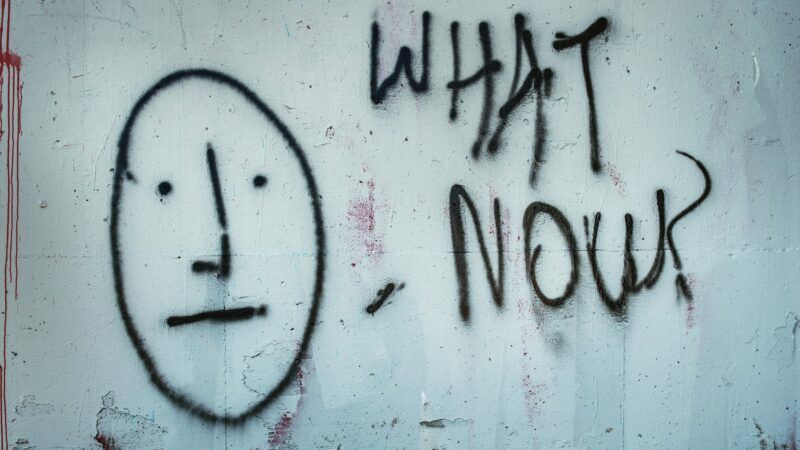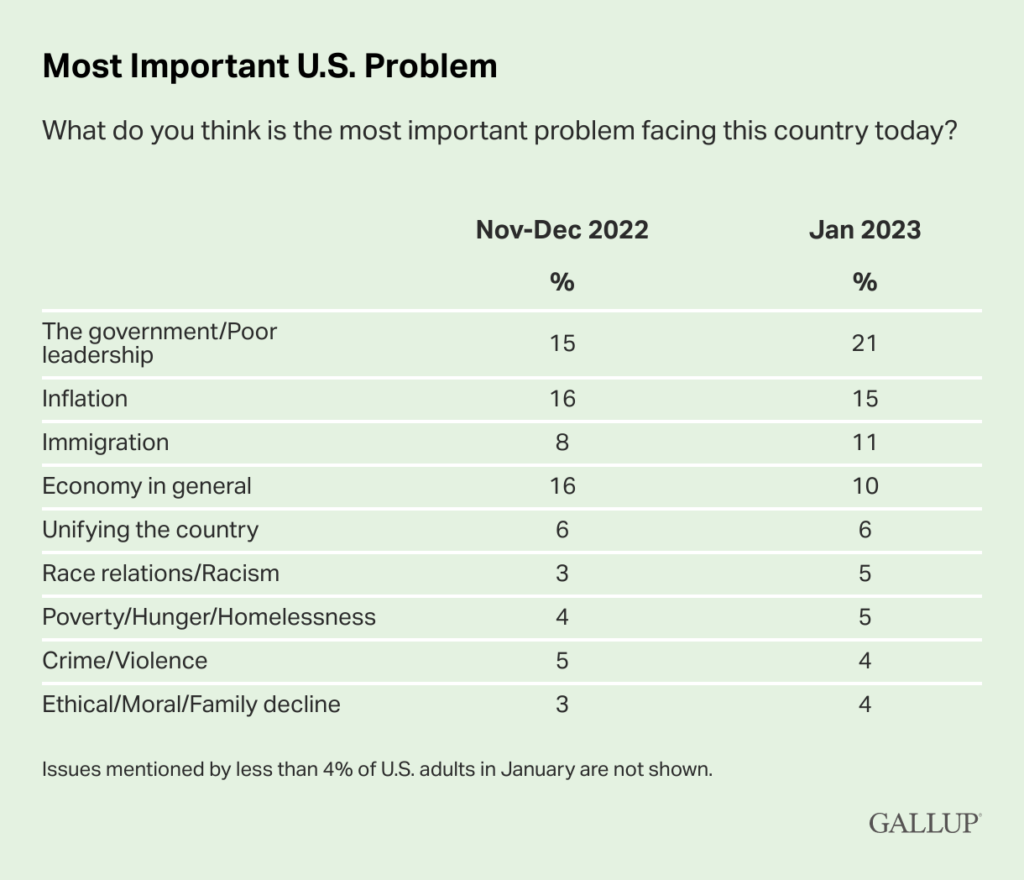Poll: One-Fifth of Americans Say Government Is Our Nation's Top Problem
Plus: Democrats doubt Harris' ability to win, an end to pandemic emergency status, and more...

What's worse than inflation? The government trying to help with inflation… or trying to help with anything, really. You know it. I know it. And a whole lot of other Americans may know it, too. In the latest Gallup poll, more than one-fifth of respondents—21 percent—cited the government and/or poor leadership as the nation's top problem.
When it comes to perceived problems, the government and poor leadership beat out inflation (cited by 15 percent of respondents), immigration (11 percent), the economy in general (10 percent), racism/race relations (5 percent), and crime/violence (4 percent).
Viewing government as problematic was a bipartisan affair, too. Government was cited as the most important problem by 24 percent of Republicans and Republican-leaning independents in the poll and by 18 percent of Democrats and Democratic-leaning independents.
Conservatives were more likely to say inflation (18 percent of conservatives vs. 11 percent of left-leaning respondents), immigration (18 percent vs. 5 percent), the economy in general (11 percent vs. 9 percent), and moral/ethical/family decline (5 percent vs. 2 percent) were top problems.
Democrats were more likely to cite crime and violence (5 percent vs. 4 percent), unifying the country (8 percent vs. 3 percent), race relations (9 percent vs. 2 percent), the environment (6 percent vs. 0 percent), and the gap between rich and poor (4 percent vs. 0 percent) as our country's top issues.
A little more than 1,000 adults were included in the poll, which has a margin of sampling error of plus or minus four percentage points.
Overall, the percentage of people who saw government as the top problem in this latest poll was up 6 percent over Gallup's November-December 2022 poll. The percentage of people citing the economy in general as the top problem shrank by 6 percent.
The latest poll was conducted from January 2–22, a period that "included the four-day, 15-vote process in which Republicans, who now hold a slim majority in the U.S. House of Representatives, ultimately elected Kevin McCarthy to be Speaker of the House," notes Gallup. These weeks also saw "revelations about classified government documents from 2009 to 2017 found in President Joe Biden's private office and home."
But the approval rating for Congress (21 percent) and for Biden (41 percent) remained unchanged since the prior Gallup poll late last year.
Check out the complete poll responses (alongside historical responses) here.
Government often ranks high among poll respondents' list of grievances. Last August and September, between 20 and 22 percent cited the government as the top issue.
FREE MINDS
Democrats doubt Harris' ability to win. The Washington Post airs Democratic worries about Vice President Kamala Harris' fitness as a presidential candidate:
Broader doubts about Harris, Democrats say, largely fall into two categories. Some party members fear that Americans are simply not willing to elect a woman of color as president, especially given the racism and sexism they see emerging in recent years. Others worry that Harris herself lacks the political skills to win a national race. …
Many of the activists reached by The Washington Post said they like Harris personally and would support her if she became the nominee, but they are not convinced she has separated herself sufficiently from other potential White House aspirants. Several Democratic governors in particular have emerged in recent months, from Michigan's Gretchen Whitmer and California's Gavin Newsom to, more recently, Maryland's Wes Moore and Pennsylvania's Josh Shapiro. …
Both supporters and skeptics say Harris has not been particularly visible, even in a job famous for its low profile. Biden and Harris were tethered to Washington during their first year by coronavirus restrictions. The first two years were further constricted for Harris, who held the tiebreaking vote in an evenly split U.S. Senate, forcing her to stay near the capital during close votes.
But Harris's low profile has also been a reflection of her team's calculus—and fears—following missteps and shaky public appearances.
More from the Post here.
Reason recently explored similar themes in "Kamala Harris Is a Flop," where we noted that Harris' underwhelming vice presidency has created a succession problem for Democrats. Harris' tenure as vice president also echoes the cycle of excitement and disappointment, the failure to meet promises and expectations, and the staff dysfunction that we've seen in Harris' previous roles, from San Francisco district attorney to 2020 presidential candidate.
FREE MARKETS
President Joe Biden says he will finally declare an end to pandemic emergency status in May. "The move to end the national emergency and public health emergency declarations would formally restructure the federal coronavirus response to treat the virus as an endemic threat to public health that can be managed through agencies' normal authorities," notes the Associated Press. That means the administration would have to (finally) stop using COVID-19 as justification for things like student loan forgiveness. It would also mean an end to a lot of government-subsidized COVID-19 prevention and medical care:
The costs of COVID-19 vaccines are also expected to skyrocket once the government stops buying them, with Pfizer saying it will charge as much as $130 per dose. Only 15% of Americans have received the recommended, updated booster that has been offered since last fall.
People with private insurance could have some out-of-pocket costs for vaccines, especially if they go to an out-of-network provider, Levitt said. Free at-home COVID tests will also come to an end. And hospitals will not get extra payments for treating COVID patients.
Legislators did extend for another two years telehealth flexibilities that were introduced as COVID-19 hit, leading health care systems around the country to regularly deliver care by smartphone or computer.
House Republicans have introduced legislation to end emergency status immediately. But such a measure would be unlikely to clear the Democrat-controlled Senate.
QUICK HITS
• The Biden administration is proposing changes to the Affordable Care Act's birth control mandate and exemptions. A Trump-era change let employers with "religious or moral" objections to birth control opt out of including it in employee health insurance coverage. The new proposal would remove "moral" from this calculation.
• More people are under fire in conjunction with the killing of Tyre Nichols by Memphis cops. "Two more Memphis police officers have been disciplined and three emergency responders fired," reports the A.P.
• Apparently the fallout from former President Donald Trump's payments to Stormy Daniels (via lawyer Michael Cohen) is still ongoing. Yesterday, Manhattan's district attorney presented evidence to a grand jury that Trump may be criminally liable.
• The Canadian province of British Columbia "will no longer criminally prosecute adults age 18 and over who are caught with less than 2.5 grams of hard drugs, including heroin, morphine, fentanyl, cocaine, methamphetamine and MDMA," notes Bloomberg. "Instead, they will be offered information on social programs and treatment, if they request it. Drug trafficking will remain illegal, regardless of the amount possessed. The experiment will last three years."
• The Chinese province of Sichuan is removing all restrictions on childbearing. The health commission announced yesterday that it "will lift restrictions on unmarried people having children and remove caps on the number of babies as part of a national drive to increase the country's birth rate," reports The Guardian.
• A couple in Cleveland is suing their neighbor over fumes from a backyard pizza oven. The trial started yesterday.


Show Comments (478)